By John Tarleton
More than 150 CUNY faculty, staff and students decended on the State Capitol March 23 to protest against Gov. Andrew Cuomo’s proposed budget cuts. Thirty-three people were arrested when they peacefully blockaded the entrance to Cuomo’s office, making headlines across the state for challenging the political establishment’s drive to impose austerity on ordinary New Yorkers while bestowing tax cuts upon the State’s wealthiest residents. Below are the voices of some of the participants.
Gail Green-Anderson
LaGuardia Community College
Professor of English
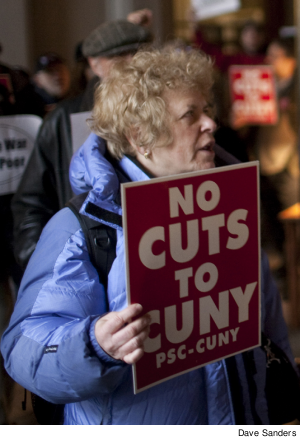 Many LaGuardia students turn to the school’s writing center for help in learning to craft college-level papers However, recent rounds of budget cuts have meant fewer tutors and longer lines during a time when LaGuardia’s enrollment has grown swiftly. For Gail Green-Anderson, co-director of the writing program at LaGuardia, the prospect of another reduction in State support for CUNY is unacceptable. On March 23, Green-Anderson traveled to Albany to protest inside the State Capitol building and provide support for faculty and students risking arrest.
Many LaGuardia students turn to the school’s writing center for help in learning to craft college-level papers However, recent rounds of budget cuts have meant fewer tutors and longer lines during a time when LaGuardia’s enrollment has grown swiftly. For Gail Green-Anderson, co-director of the writing program at LaGuardia, the prospect of another reduction in State support for CUNY is unacceptable. On March 23, Green-Anderson traveled to Albany to protest inside the State Capitol building and provide support for faculty and students risking arrest.
“I’m on the bus today,” she told Clarion, “because if the Writing Center can’t get more tutors, more of my students will fail their classes.”
“From 25 years of teaching, I know their grades will skyrocket if they get the help they need,” Green-Anderson added.
Donna Gill
Hunter School of Nursing
HEO Assistant
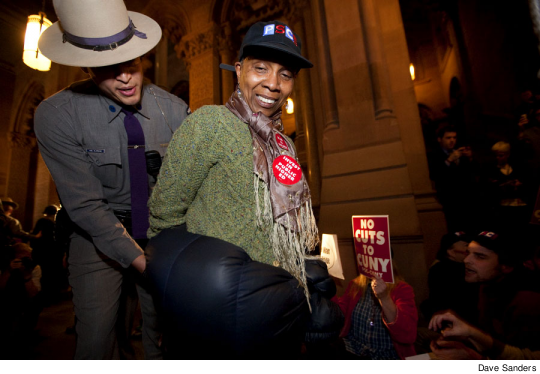 As her son was growing up, Donna Gill warned him many times about the importance of not doing anything that would risk getting arrested. On the night before the March 23 action in Albany, the tables were turned. Gill was one of 33 CUNY faculty, staff and students who had volunteered to risk arrest while engaging in non-violent civil disobedience inside the State Capitol building. And Gill’s son reminded her of their past talks about not going to jail.
As her son was growing up, Donna Gill warned him many times about the importance of not doing anything that would risk getting arrested. On the night before the March 23 action in Albany, the tables were turned. Gill was one of 33 CUNY faculty, staff and students who had volunteered to risk arrest while engaging in non-violent civil disobedience inside the State Capitol building. And Gill’s son reminded her of their past talks about not going to jail.
“It’s a scary thought,” Gill said during the bus ride to Albany. “But the cause is worth it. CUNY is working on the bare minimum. There’s not enough professors. The professional staff has been decimated. People are already overworked.”
Before moving to the School of Nursing, Gill worked in her college’s financial aid office which she said is straining to meet student needs. She also said CUNY was suffering in smaller ways as well. For example, Gill said, campus buildings are not being cleaned as frequently due to a reduction in the number of support staff at a time when enrollment has been increasing.
“How are we going to service students if there’s not enough of us?” She asked.
Nikki McDaniel
Bronx Community College
Associate Professor of Biology
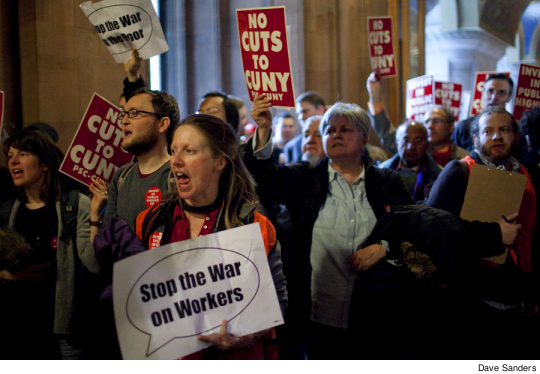 Sitting in her bus seat busily preparing worksheets on meiosis and human reproduction, Nikki McDaniel ticked off the reasons why she was traveling to Albany and would be supporting those risking arrest. Seventy-five percent of BCC students, she estimated, are working full-time while faced with increasing tuition and decreasing financial aid. Laboratories are not available for activities like dissection, she added. And professors carrying a 5-4 course load and find themselves unable to give students all the attention they need.
Sitting in her bus seat busily preparing worksheets on meiosis and human reproduction, Nikki McDaniel ticked off the reasons why she was traveling to Albany and would be supporting those risking arrest. Seventy-five percent of BCC students, she estimated, are working full-time while faced with increasing tuition and decreasing financial aid. Laboratories are not available for activities like dissection, she added. And professors carrying a 5-4 course load and find themselves unable to give students all the attention they need.
“I feel like I don’t have a choice,” McDaniel said of her decision to participate in the March 23 action. “If you want to effect change, it takes real action.”
Bonnie Nelson
John Jay
Faculty Librarian
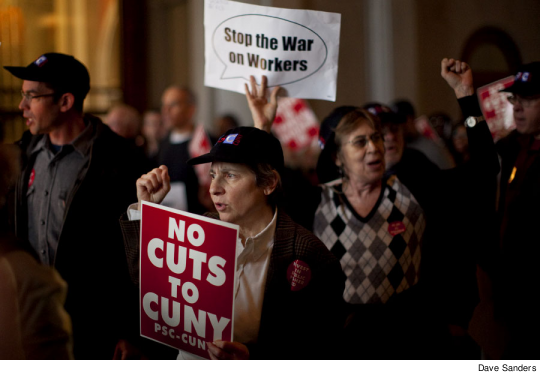 Gov. Andrew Cuomo’s proposed budget cuts will do damage across CUNY and Bonnie Nelson says libraries are unlikely to be spared. At the John Jay library where she works, Nelson says they would have to reduce purchases of books and electronic journals and vacant positions will go unfilled. Library hours may have to be reduced as well which would be especially harmful to students who rely on the library as a quiet haven where they can focus on their studies.
Gov. Andrew Cuomo’s proposed budget cuts will do damage across CUNY and Bonnie Nelson says libraries are unlikely to be spared. At the John Jay library where she works, Nelson says they would have to reduce purchases of books and electronic journals and vacant positions will go unfilled. Library hours may have to be reduced as well which would be especially harmful to students who rely on the library as a quiet haven where they can focus on their studies.
“We’ve been overworked and understaffed for a long time and we can’t cut back anymore.” Nelson said as she entered the Capitol building preparing to risk arrest. “What they’re proposing is an immoral budget and I have a moral obligation to try and do something about it.”
Glenn Petersen
Baruch
Chair of Dept. of Sociology and Anthropology
 “I believe you have to take a stand. This was a very clear, articulate way of saying you opposed the cuts the governor is trying to impose,” Glen Petersen told Clarion while he waited to be released from a makeshift holding room in the Capitol. It was two hours after the mass arrest and Petersen and the 32 other detainees were quietly talking among themselves while the State Police finished processing their paperwork. The police had just released the detainees from their plastic handcuffs and Petersen said relations between the two groups had been quite cordial.
“I believe you have to take a stand. This was a very clear, articulate way of saying you opposed the cuts the governor is trying to impose,” Glen Petersen told Clarion while he waited to be released from a makeshift holding room in the Capitol. It was two hours after the mass arrest and Petersen and the 32 other detainees were quietly talking among themselves while the State Police finished processing their paperwork. The police had just released the detainees from their plastic handcuffs and Petersen said relations between the two groups had been quite cordial.
“They understand exactly what the consequences of cuts in public service employees are,” Petersen noted. “They were very friendly and supportive of what we had to do and we understood what they had to do. It was a nice meeting of two agendas.”
Irene Rozenberg
Brooklyn College
Student
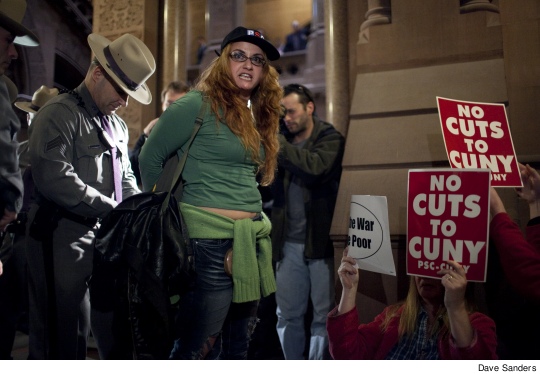 Irene Rozenberg heard about plans for the March 23 action in Albany days beforehand while walking past one of her professors in the hallway at Brooklyn College. She attended a civil disobedience training class at the PSC Union Hall and was one of a few students arrested during the action in which people sat down together and peacefully blockaded the entrance to Gov. Andrew Cuomo’s office.
Irene Rozenberg heard about plans for the March 23 action in Albany days beforehand while walking past one of her professors in the hallway at Brooklyn College. She attended a civil disobedience training class at the PSC Union Hall and was one of a few students arrested during the action in which people sat down together and peacefully blockaded the entrance to Gov. Andrew Cuomo’s office.
“It was very empowering sitting all together like that. Everyone turned beet red we were shouting so loud,” said Rozenberg, a senior with a double major in English and American Studies who dropped out of college from 2007 to 2010 due to a lack of funds. “It was a huge adrenaline rush.”
Getting arrested “is not as scary as you think,” said Rozenberg and, “you get to see your teachers in a different way.”
Her one regret about the action? “I wish more of the teachers had invited students,” she said.
Bill Friedheim
Retiree Chapter
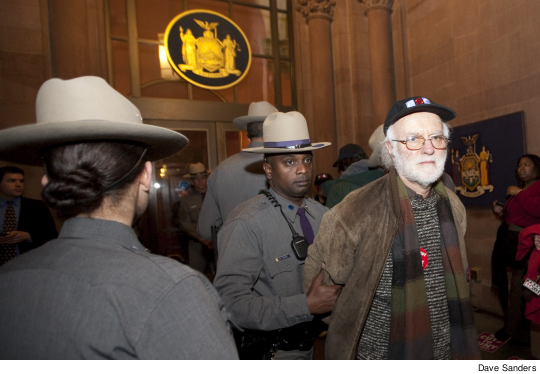 Retired BMCC history professor Bill Friedheim was first arrested for civil disobedience in the spring of 1970 when he and Jim Perlstein (who now chairs the Retirees Chapter) joined a student protest calling for open admissions and changes in the school’s curriculum. Now in their 70s, Friedheim and Perlstein were two of the oldest arrestees at the March 23 action.
Retired BMCC history professor Bill Friedheim was first arrested for civil disobedience in the spring of 1970 when he and Jim Perlstein (who now chairs the Retirees Chapter) joined a student protest calling for open admissions and changes in the school’s curriculum. Now in their 70s, Friedheim and Perlstein were two of the oldest arrestees at the March 23 action.
“It keeps me young,” Friedheim joked on the bus ride home. “The level of energy was increasing throughout the day. I think a lot of people were coming to observe us not just because we were making a lot of noise but because we were right.
“There’s been a tremendous transfer of wealth from the public sector to the private sector and from the middle and lower rungs of society to the upper rungs of society,” Friedheim said. “Actions like this begin to change the political discourse. I think people are sick and tired of the finger being pointed at public sector workers and teachers as the cause of all problems.”

